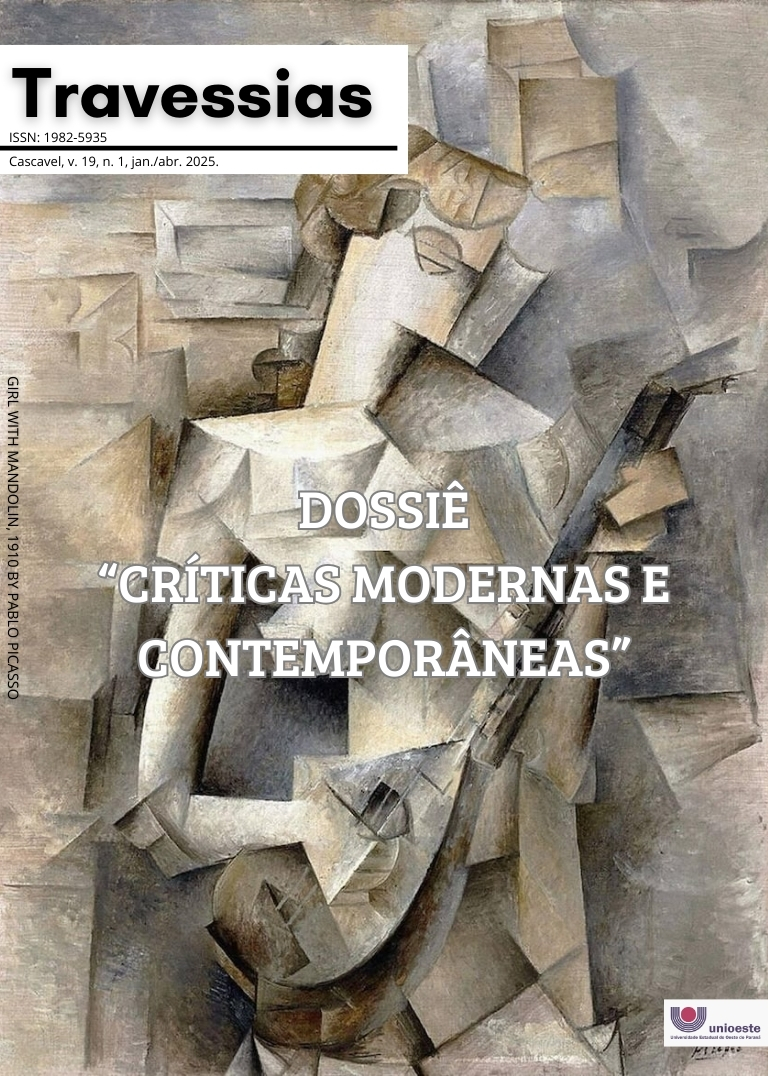Trânsfugas na modernidade
literatura e política em Machado de Assis, Sílvio Romero e Clóvis Beviláqua no Brasil do fin-de-siècle
DOI:
https://doi.org/10.48075/rt.v19i1.35008Palavras-chave:
Modernidade no Brasil, Machado de Assis, Silvio Romero, Clóvis BeviláquaResumo
Neste artigo, serão exploradas as interseções entre literatura e política no Brasil da virada do século XIX para o XX, a partir das trajetórias de Machado de Assis, Silvio Romero e Clóvis Beviláqua. Partindo de Machado - Romance (2016), de Silviano Santiago, analisa-se como as transformações da modernidade se refletiram na vida e obra de Machado, especialmente em seus últimos anos (entre 1905 e 1908), destacando-se como as tensões sociais e políticas da época se inscrevem na experiência pessoal do autor e em suas relações de sociabilidade. Já Silvio Romero e Clóvis Beviláqua são analisados enquanto intelectuais trânsfugas, no sentido de que seu esforço por autonomia os levou a não se enquadrarem plenamente nas estruturas (intelectuais e sociais) dominantes. Dentro desse prisma, os três autores analisados oferecem, ainda que implicitamente, uma visão crítica da modernidade brasileira. A reflexão sobre esses intelectuais permite compreender as contradições da modernidade no Brasil, destacando o entrecruzamento da literatura, da política e da cultura como espaço privilegiado de análise dessas tensões. Além de Silviano Santiago, toma-se como referências teóricas as ideias de Edward Said (2005) sobre o papel dos intelectuais e Eric Santner (2011) sobre a dualidade constitutiva do processo de construção da modernidade.
Downloads
Referências
BEVILÁQUA, Clóvis. A filosofia positiva no Brasil. Esboços e Fragmentos. Rio de Janeiro: Laemmert e C. Editores, 1899.
CANDIDO, Antonio. O método crítico de Sílvio Romero. 4. ed. Rio de Janeiro: Ouro sobre azul, 2006.
CANDIDO, Antonio. Sílvio Romero: crítico e historiador da literatura. In: PAIM, Antonio (org.). Sílvio Romero (1851/1914): bibliografia e estudos críticos. Salvador: Centro de Documentação do Pensamento Brasileiro, 1999. p. 23-40.
CERQUEIRA, Gabriel S. “Bando de ideias novas”: circulação ideias e redes de sociabilidade entre Recife e Bahia. Passagens: Revista Internacional de História Política e Cultura Jurídica, v. 11, n. 2, p. 238-258, 31 maio 2019. Disponível em: http://www.revistapassagens.uff.br/index.php/Passagens/article/view/239/228. Acesso em: 22 abr. 2025.
GINZBURG, Carlo. Relações de força: história, retórica e prova. São Paulo: Companhia das Letras, 2002.
GRAMSCI, A. Cadernos do Cárcere. Vol. 2: Os intelectuais, o princípio educativo, jornalismo. 2. ed. Rio de Janeiro: Civilização Brasileira, 2001.
KANTOROWICZ, Enrst. Os dois corpos do Rei: um estudo sobre teologia política medieval. São Paulo: Companhia das Letras, 1998.
MENDONÇA, Carlos Sussekind De. Silvo Romero: sua formação intelectual (1851-1880). São Paulo: Companhia Editora Nacional, 1938.
NEDER, Gizlene. Iluminismo jurídico-penal luso-brasileiro: obediência e submissão. Rio de Janeiro: Freitas Bastos Editora, 2000.
NEDER, Gizlene; CERQUEIRA FILHO, Gisálio. Ideias jurídicas e autoridade na família. Rio de Janeiro: Revan, 2007.
PRADO, Antonio Arnoni. Sílvio Romero (a crítica e o método). Literatura e Sociedade, n. 11, p. 96–110, 2009.
SAID, Edward. W. Representações do intelectual: as conferências Reith de 1993. São Paulo: Companhia das Letras, 2005.
SANTIAGO, Silviano. Retórica da Verossimilhança. Discursos Sediciosos - crime, direito e sociedade, v. 1, n. 1, 1996.
SANTIAGO, Silviano. Machado - Romance. São Paulo: Companhia das Letras, 2016.
SANTNER, Eric L. A Alemanha de Schreber: uma história secreta da modernidade. Rio de Janeiro: Zahar, 2009.
SANTNER, Eric L. The royal remains: the people’s two bodies and the endgames of sovereignty. Chicago: The University of Chicago Press, 2011.
SCHWARCZ, Lilia Moritz. O Espetáculo das Raças: cientistas, instituições e questão racial no Brasil (1870-1930). São Paulo: Companhia das Letras, 1993.
SERBIN, Kenneth. Padres, celibato e conflito social: uma história da Igreja Católica no Brasil. São Paulo: Companhia das Letras, 2008.
VERÍSSIMO, José. Sobre alguns conceitos do Sr. Silvio Romero. O que é literatura e outros escritos. São Paulo: Landy Editora, 2001.
VITA, Luís Washington. Introdução. Sílvio Romero: Obra Filosófica. Rio de Janeiro: Livraria José Olympio, 1969.
Downloads
Publicado
Como Citar
Edição
Seção
Licença
Copyright (c) 2025 Autores mantêm os direitos autorais e concedem à revista o direito de primeira publicação, com o trabalho simultaneamente licenciado sob CC-BY-NC-SA 4.0 que permite o compartilhamento do trabalho com indicação da autoria e publicação inicial nesta revista

Este trabalho está licenciado sob uma licença Creative Commons Attribution-NonCommercial-ShareAlike 4.0 International License.
Aviso de Direito Autoral Creative Commons
Política para Periódicos de Acesso Livre
Autores que publicam nesta revista concordam com os seguintes termos:
1. Autores mantêm os direitos autorais e concedem à revista o direito de primeira publicação, com o trabalho simultaneamente licenciado sob a Licença Creative Commons Attribution que permite o compartilhamento do trabalho com reconhecimento da autoria e publicação inicial nesta revista.
2. Autores têm autorização para assumir contratos adicionais separadamente, para distribuição não-exclusiva da versão do trabalho publicada nesta revista (ex.: publicar em repositório institucional ou como capítulo de livro), com reconhecimento de autoria e publicação inicial nesta revista.
3. Autores têm permissão e são estimulados a publicar e distribuir seu trabalho online (ex.: em repositórios institucionais ou na sua página pessoal) a qualquer ponto antes ou durante o processo editorial, já que isso pode gerar alterações produtivas, bem como aumentar o impacto e a citação do trabalho publicado (Veja O Efeito do Acesso Livre).
Licença Creative Commons
Esta obra está licenciada com uma Licença Creative Commons Atribuição-NãoComercial-CompartilhaIgual 4.0 Internacional, o que permite compartilhar, copiar, distribuir, exibir, reproduzir, a totalidade ou partes desde que não tenha objetivo comercial e sejam citados os autores e a fonte.



